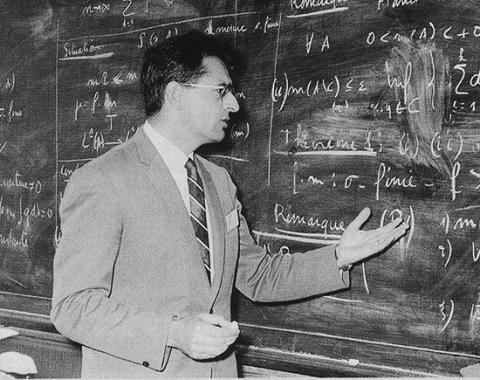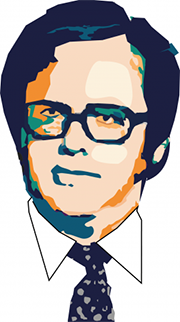They have built up or shaped digital research at IRISA since 1975.
Today, Michel MÉTIVIER and Jacques LENFANT inspire, each in their own scientific field, the digital researchers of tomorrow.
Michel Métivier (1931-1988) An applied probabilist

Both a researcher and a teacher, Michel MÉTIVIER has become a first-rate mathematician, always committed to strengthening the links between probability, his favorite field, and experimental sciences.
Michel Métivier completed all of his graduate studies at the Faculty of Science in Rennes and defended his doctoral thesis on martingales (1) in 1963 before taking up a professorship there in 1965. He then became actively involved in the organization of studies and, in 1969, became director of the Teaching and Research Unit of Mathematics and Computer Science. He remained in this position until 1971.
From the creation of IRISA...
Very early on, Michel Métivier perceived the interest of research in computer science associated with probability. Anxious to advance both research and teaching, he put his ideas into practice with the creation of the Institut de recherche en informatique et systèmes aléatoires (IRISA) in Rennes, of which he was the first director in 1975.
...to Polytechnique
In 1976, he was appointed professor at the Ecole Polytechnique in Paris. Here again, he played an essential role in the reform of teaching and was involved 'in all the major actions carried out at Polytechnique [...] with untiring generosity' according to his physics colleague, Jean-Louis Basdevant. He became Chairman of the Department of Applied Mathematics and is also a member of the school's Board of Directors, where his influence enables him to work for multidisciplinarity.
He thus set up a weekly seminar during which researchers from other disciplines such as physicists, chemists and biologists take part. Its aim is to confront its own results with the problems posed by other sciences in order to verify how probability theory can help to understand phenomena described by the experimental sciences.
One of his former students, Jean Mémin, says about him:
From the end of the 1970s and onwards, numerous probability research projects were developed in collaboration with different fields of mathematics or with other disciplines, with the objective of modeling natural phenomena.
A world-renowned probabilist

Michel Métivier's research focused on many areas of probability and contributes to the development of stochastic calculus (see below). He obviously worked on the application of his results, especially in physics and chemistry. In 1987, despite suffering from cancer, he organized the Paul Lévy(2) conference, which was a great success. Struck in the middle of his work, he died a year later at the age of 57. By all accounts, he remains one of the French probabilists who contributed most to the scientific influence of the country, giving numerous courses in foreign universities.
M. Métivier and stochastic calculus
Michel Métivier, as a researcher, has specialized in 'stochastic processes', terms by which probabilists designate any phenomenon that depends on chance and evolves over time. The change in the outside temperature, the price of a share on the stock exchange or the movement of electrons around the nucleus of an atom are all examples of phenomena for which we do not have certain information but only probabilities. Michel Métivier has particularly studied stochastic integrals ('Stochastic Integration', with Jean Pellaumail, Academic Press, 1980): they allow the modelling of many natural random phenomena.
Sources: article Espace des Sciences
(1) "Martingales à valeurs vectorielles. Applications à la dérivation des mesures vectorielles" M. Métivier. Document numérisé par Numdam
(2) Symposium organized by M. Metivier, J. Neveu and S.R.S. Varadhan, on the occasion of the hundredth anniversary of the birth of Paul Lévy.
To read:
[FR] Algorithmes adaptatifs et approximations stochastiques: théorie et applications à l'identification, au traitement du signal et à la reconnaissance des formes. Albert Benveniste, Michel Métivier, Pierre Priouret. Masson, Techniques stochastiques, 1987.
[EN] Adaptive algorithms and stochastic approximations. Albert Benveniste, Michel Métivier, Pierre Priouret. Springer Verlag, Applications of Mathematics, vol. 22, Berlin, Heidelberg, New York, 1990. Online: http://link.springer.com/book/10.1007/978-3-642-75894-2
Jacques Lenfant (1947-2015) Portrait of an intuitive precursor
39 years at the service of research and teaching in computer science

Fifth president of the Université de Rennes 1 between 1994 and 1999, Jacques Lenfant was one of the first promoters of teaching and research in computer science, particularly in Rennes.
Jacques Lenfant joined the university in 1970, as a professor at ISTIC (formerly Ifsic), and was a professor-researcher at IRISA, an institute of which he was interim director for nearly two years (1976-78).
He then spent ten months at the University of Michigan and came back with many ideas for the development of research on parallel computing, which made him a recognized specialist in the world of research but also in industry.
An expert in the design of very high-speed processors, he was also the founder of the parallel computing group at IRISA in 1976, and in the 1980s was one of the pioneers of the national "Large Scientific Computers" project, which aimed to create a supercomputer industry in France. He was also a scientific advisor at Sintra-Alcatel and then at Thomson-CSF.
Alongside his research in the field of parallel computing and its applications (electronics, aeronautics, etc.), Jacques Lenfant was also very involved in teaching, from undergraduate to postgraduate levels. He was the promoter and manager of several courses at the University of Rennes 1, and was the creator of several advanced degrees in computer science, including the Diplôme d'Ingénieur en Informatique et Communication (DIIC) from which ESIR emerged.
Jacques Lenfant was elected President of the University of Rennes 1 on February 18, 1994, after serving as Vice President of the Scientific Council for five years, contributing greatly to instilling the institution with an openness and dynamism that still bears fruit today.
Since the end of his mandate in March 1999, Jacques Lenfant has worked mainly on the dissemination of culture and scientific education. The first Breton to be elected a member of the Académie des technologies, he ended his career in 2009 after three years as director of the Centre d'initiation à l'enseignement supérieur du Grand Ouest.
Research areas: Modeling and performance evaluation of computer systems, Design of supercomputers, Parallel memories and interconnection networks.
Industrial collaborations: Marie supercomputer project; Participation in the Marisis project.
